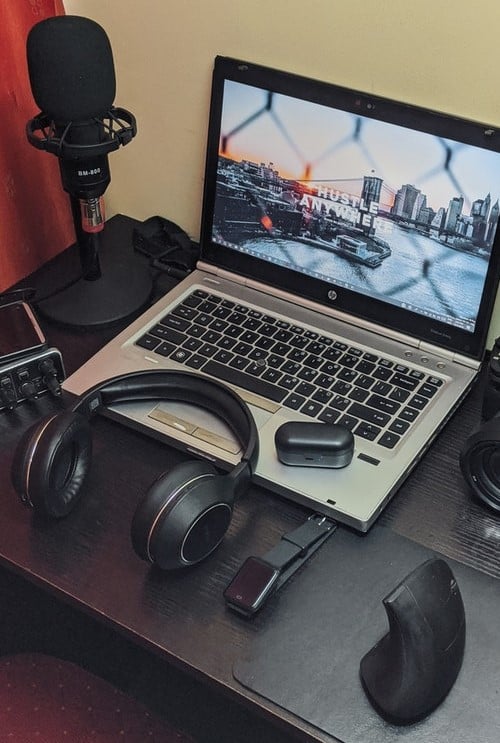These days, the move to “wireless” headphones is well underway. Tech companies like Apple and Samsung are removing headphone ports from their smartphones as more people switch to Bluetooth earbuds and headsets. When it comes to buying dedicated wireless headphones for watching TV, there is a lot of confusion about what exactly these specialist speakers are.
You may have noticed I used the term “wireless” and “Bluetooth” in the first paragraph. You’re probably thinking, “aren’t they exactly the same thing?” Well, the answer is yes, and no.
Bluetooth headphones are wireless by the default that they have no wire. However, a dedicated wireless headphones set is something different.
In the article below, I’ll go over the differences between them and what you need to look out for when buying dedicated wireless headphones to watch TV.
Wireless headphones for TV: Difference between wireless and Bluetooth
As mentioned, the terms wireless and Bluetooth seem interchangeable, or that they mean exactly the same thing. However, for headphone technology there is a difference that most people have never heard of.

Here’s a little equation to help you… not all wireless headphones have Bluetooth, but all Bluetooth headphones are wireless.
Trust us, it’s not as confusing as it sounds. We’ll break it down into detail below, but here are the cliff notes of the differences between wireless and Bluetooth headphones.
- Bluetooth technology uses radio waves that transmit data from device to device. For headphones, this means audio signals sent over radio waves. Dedicated wireless headphones use infrared signals to transmit audio.
- Infrared is light based and not sound based like radio. This means wireless headphones have a much bigger range (100 meters) compared to Bluetooth headphones (30 meters). Bluetooth also only works when there is a line of sight between the two devices.
- It’s much more versatile than wireless headphones and is compatible from any device to any other device that supports the connection. Wireless headphones only work with another device from the same brand.
- Similarly, Bluetooth is easier to set up and use.
- Both wireless and Bluetooth lack the audio quality of comparably priced and teched wired headphones.
Simply different technology
So, wireless headphones and Bluetooth headphones are based on a different technological base. Bluetooth only uses radio signals to connect two devices, while wireless sets can use radio but more commonly utilize infrared (IR) signals to receive and send audio.
By using Bluetooth users can connect one device to another that is within range, usually a peripheral like headphones, speaker, mouse, or keyboard with a smartphone or PC. Bluetooth headphones use a battery that needs regular charging. Wireless headphones take IR signal from a base unit that connects to the TV.
Wireless Headphones for TV: Dedicated wireless headphones
If you want dedicated wireless headphones to watch TV, finding the right set is important. Wireless headphones can enhance the TV viewing experience, making a massive difference on those Netflix binges or all-night gaming sessions. Before looking for products, it’s worth understanding these devices and how they function with your TV. Below is our buyer’s guide to help you choose the best dedicated wireless headphones for TV.
Of course, the main benefit of using this type of headphone is you get a cordless listening experience. When you want to relax and watch a movie, having a wire in the way can be annoying. Wireless headphones, instead of tapping into your TV’s Bluetooth capability, takes signal from a base unit.
This base unit is connected to the TV via the optical port or 3.5mm headphone jack. This base unit is not tethered physically to the headphones and sends IR or RF (radio frequency) signals to the headphones. Range limitations are greater than Bluetooth headphones and audio quality is usually better.
That’s why many true audiophiles prefer to use dedicated wireless headphones over their Bluetooth counterparts. Because they produce high-fidelity audio, dedicated wireless sets typically land on the higher end of the market and are often expensive compared to standard headphones.
Wireless Headphones for TV: What you need to know
Here are some key things you should consider when choosing a dedicated set of wireless headphones:

Sound Quality is Important
There is really no reason to choose RF/IR wireless headphones over Bluetooth if you don’t care about sound. These dedicated headphones are all about getting the best audio experience possible when watching TV. As is always the case, some products on the market are better than others. Doing some research and reading reviews can get you headphones with the best audio quality.
Expect to pay a premium to have dedicated wireless headphones with the absolute best listening experience and audio technology.
Comfort and Style are Important too
It’s amazing how many people overlook the comfort of headphones and only look for the best sound quality. There’s no point having stellar audio if you cannot wear those cups for longer than an hour. Headphone fatigue is real and when reading reviews check out what people say about comfort. A good bet is over-ear dedicated wireless headphones that don’t apply too much pressure on the ear.
Alongside comfort, you surely want your headphones to look good too. That’s subjective, but the good news is the leading products on the market usually combine audio quality, comfort, and style in a good way.




